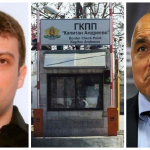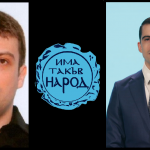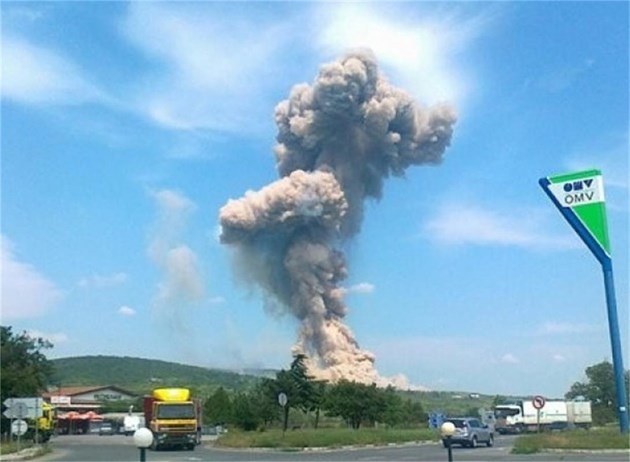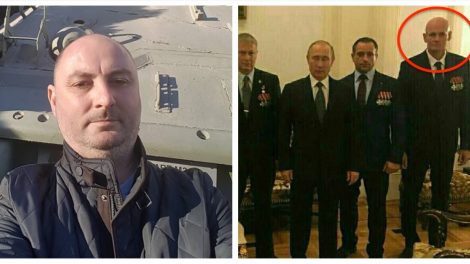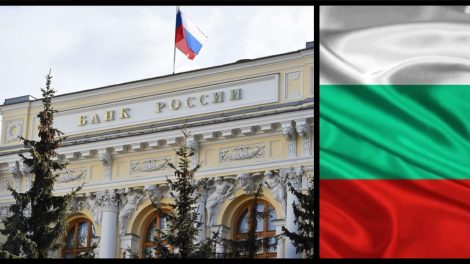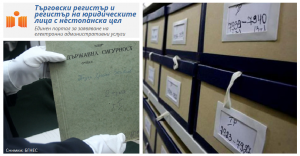Affected Russian interests and sabotage by agents of the Central Intelligence Agency – this is how the prosecutor’s office explained last week the four explosions of ammunition in military warehouses from 2011, 2015 and 2020. The unexpected prosecutorial activity came after the Czech Republic announced a link between explosions in its warehouses and the attempt to poison the arms dealer Emilian Gebrev, and the investigative portal Bellingcat confirmed the presence of Russian agents on Czech and Bulgarian territory at the time of these events. However, there is another explosion – that of Petolachkata dated in 2012, the official version announced an industrial accident, but there were serious indications of sabotage, which the prosecutor’s office refused to investigate. The key information is that this explosion destroyed a large consignment of weapons destined for Georgia by a company that has good relations with the authorities.
From the explosions in the Czech Republic to Novichok in Bulgaria
In the course of the most tremendous spy scandal since the end of the Cold War, the Czech Republic expelled 18 Russian diplomats and forced Russia to recall another 70 staff members at its embassy in Prague. As a sign of support, Slovakia announced three other Russian diplomats as persona non grata. The sharp diplomatic reaction came as a result of allegations by the Czech security services that the explosion of ammunition in a private warehouse near Vrbětice in 2014 was provoked by the intervention of Russian intelligence services.
According to Prague, the explosion was not planned to take place on Czech territory, and it was to be implemented on Bulgarian territory. “Deutsche Welle” reported that Russian intelligence secret agents Alexander Mishkin and Anatoly Chepiga were involved in the blast. During their stay in the Czech Republic from 11 to 16 October 2014, they presented themselves with Russian passports in the names of Alexander Petrov and Ruslan Boshirov. They have also used passport in the name of the citizen of Moldova Nikolay Pop and citizen of Tajikistan Ruslan Tabarov. According to Czech media, the attack on the warehouse was carried out to prevent a deal involving Bulgarian arms dealer Emilian Gebrev. The industrialist was poisoned in 2015, probably with “Novichok” but survived.
The weekly newspaper “Respekt” claims that the ammunition stored in the warehouse were probably intended for deliveries in Ukraine and other media has identified the rebels in Syria as the final recipient. Czech Prime Minister Andrej Babiš said ammunition had already been paid at the time of the blast. On April 27, the Bulgarian company EMKO of Emilian Gebrev, disseminated documents according to which their goods were not destroyed in the incident in the Czech Republic in 2014. The company denies that exports to Ukraine were planned at the time. The statement also says that “so far the only irrefutable proven fact that connects the terrorist acts in the Czech Republic in 2014, in Bulgaria in 2015, and in Great Britain in 2018, is participation in them of the same agents of the Russian special services, Detachment 29155 of the Central Intelligence Agency – GRU.”
These revelations drew attention to the work of the Bulgarian investigative bodies. Their silence on the subject became intolerable after the investigative website Bellingket confirmed the data of the Czech state. Ultimately personally Attorney General Geshev announced that in Bulgaria there were explosions of ammunition as a result of hostile action of the Central Intelligence Agency – GRU. Moreover, four explosions in the last ten years, all of which were in some way connected with Gebrev’s EMKO company.
The prosecution pointed to several recurring elements in the incidents, which are suspected to be the result of GRU sabotage. The blasts “happened” in ammunition depots that were destined for export to countries hostile to the Putin regime. These include Ukraine, Georgia or the opponents of Bashar Assad in Syria. Most often, the explosions were preceded by a fire, which forced most of the employees to leave the epicenter of the future explosion, so as to avoid casualties – what humanity has been shown by the GRU. Also, in all cases, goods or infrastructure owned by the company EMKO of the arms dealer Emilian Gebrev were affected.
However, there is another very typical condition, which Geshev did not mention. And that is that the prosecutor’s office refused to investigate a potential sabotage after these “incidents”. Even if data are collected on such a diversion, as is the case with the warehouses in Lovnidol, the investigation does not continue in the direction of terrorism or sabotage, but is terminated. And so on until international pressure forced Bulgarian investigators to admit the obvious.
EMCO denied the allegations of the prosecutor’s office, stating that two of the incidents mentioned by the state prosecution had nothing to do with their activities. The company defines as disinformation the statement of the prosecutor’s office that its production has something to do with the explosions in VMZ Sopot. The Communication notes that the explosion in warehouses in Lovnidol in 2011 was not preceded by fire, such information was formally circulated. Although the pre-trial proceedings gathered evidence of a detonated explosive device, which probably caused the explosions of projectile shells in the company’s warehouse near Gabrovo, the investigation was terminated.
The fact is that Emilian Gebrev has been at the forefront not only of GRU agents for years, but also at the forefront of influential native factors. Appetite aimed at his business and in particular at the Dunarit weapons factory was expressed not by anyone, but by deputy MP Delyan Peevski himself through the affiliated company Viafot. He received full support in this regard from the state raider machine against EMCO, which has not yet been finalized. Attempts to poison Gebrev were completely ignored by the state prosecution. Former Chief Prosecutor Sotir Tsatsarov even declared them food poisoning with arugula. While GRU agents are tasked with carrying out sabotage operations while traveling in the Czech Republic and Bulgaria, Tsatsarov and his future successor, Geshev, are exchanging visits with Russian Prosecutor General Chaika, demonstrating excellent relations with him.
Invisible weapons destined for Georgia by Petolachkata
The insight of the prosecution, that the GRU tracks and blows up military products intended for countries hostile to Russia, requires a completely new reading of all incidents with explosions in Bulgarian warehouses, for which data are available, that they had stored weapons destined for Georgia, Ukraine or Syria. Such is the case with the explosion near the Petolachkata road junction on June 5, 2012, when under strange circumstances start explosions of ammunition warehouses Base “Straldza – Marash.” Eyewitnesses tell the media that the first explosion was followed by a series of secondary detonations. Some of the workers evacuated on their own, leaving the base on foot, while others were transported by car to the hospital. Three of the employees died.
The official version of the investigating authorities is, that on the day of the incident it is these three unfortunates have dismantled a combat unit of anti-aircraft missile “Dvina”. The explosion started from workshop 1, where it is assumed that they died on the spot. Their other colleagues survived because they were outside the workshop. Eight months after the blasts, prosecutors are have been indicted as defendants the owner of the company “Beretta Trading” Delislav Delev and the head of production at the base “Straldzha – Marash” Ivan Peev. Nine years after the “incident”, the case is still at first instance.
However, the state prosecution ignored some important details in this case. Indeed, the base is owned by Desislav Delev, through his company “Beretta Trading”. But he used only two of the seven “Dutch” halls (some single, some double). There is carried out storage and disposal of ammunition under contract with the Defense Ministry. But most of the warehouses are rented by another company – „Sage Consultants“ and this company keeps weapons destined for Georgia in the warehouses in question. Bureau for Investigative Reporting and Data got the documentation that proves this in an indisputable way.
We are talking about significant quantities of weapons and ammunition – from Kalashnikovs to howitzers, which are worth tens of millions of dollars (prices, which are a trade secret, have been deleted). The documents we have, indicate that in 2011 – 2012 “Sage” stored the goods in the halls of Petolachkata, and from there transported it to Georgia through the port of Burgas.
No need to be reminded that after the 2008 blitz war, Georgia became a major target of Russian special services. The Sage ammunition from Petolachkata was supposed to fill the deficit of the Georgian army after an explosion in a warehouse with military equipment on the territory of the former Soviet republic. But an “accident” partially destroyed this production, purchased in Bulgaria.
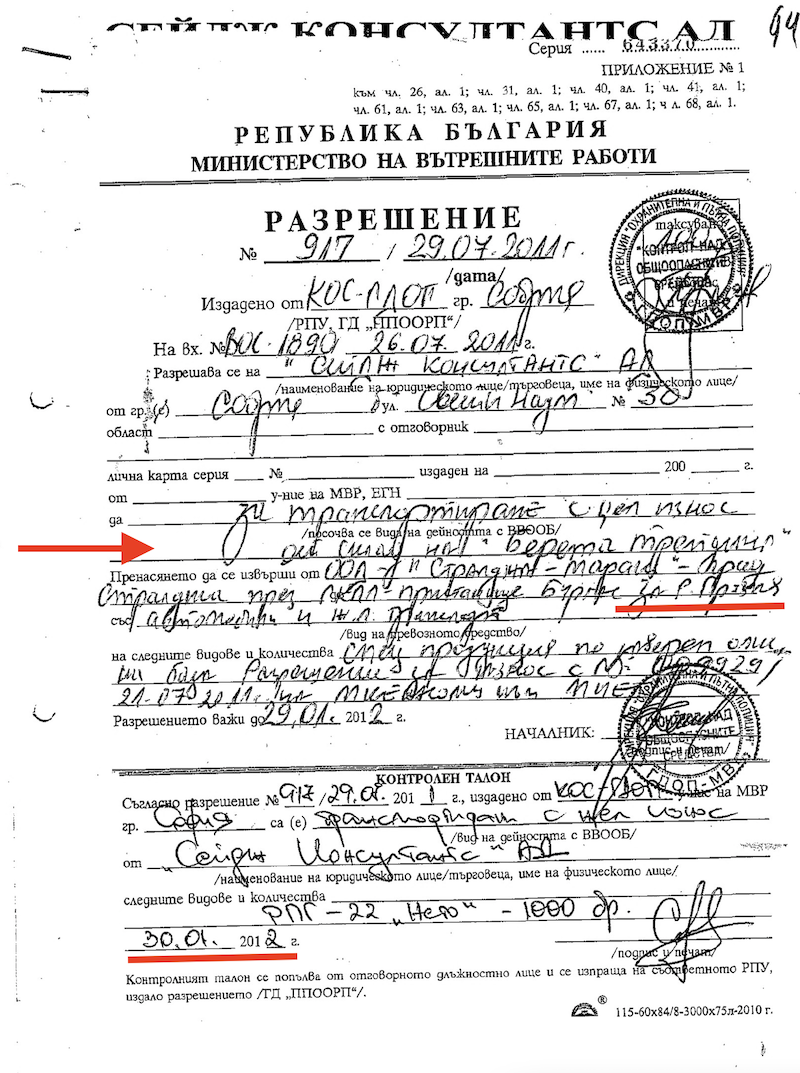
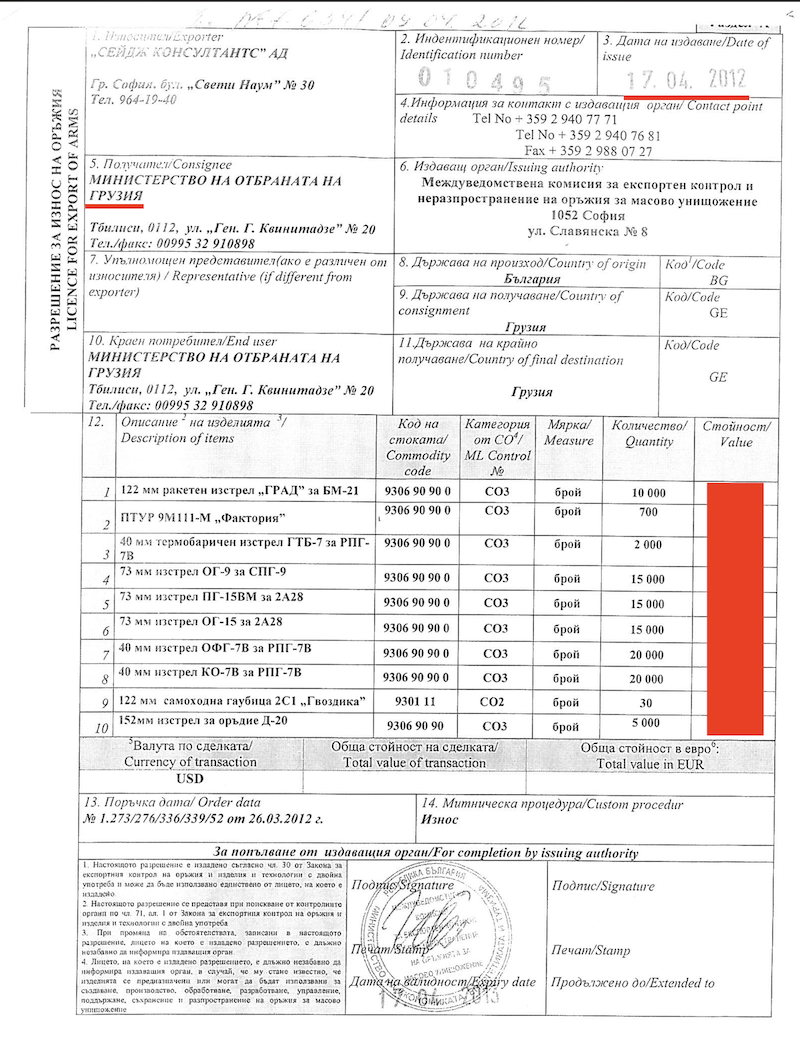
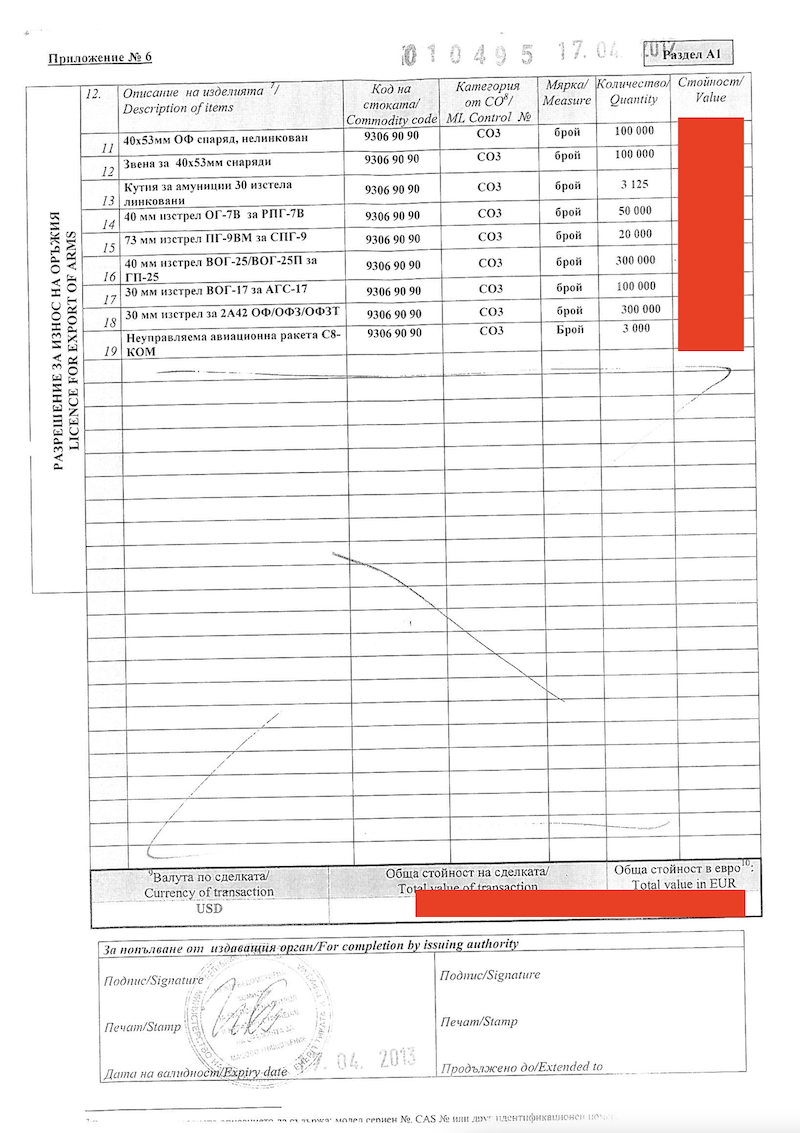
According to the Trade Register, Sage Consultants is owned by Hristo Yordanov Hristov, and the manager is Gencho Valkov Hristov, also known as “Petrov” agent of the State Security. Both are iconic names in the market for dual-use goods. Transmedia Studio was the first to announce in 2019 that arms dealer Hristo Yordanov Hristov is the likely buyer of a luxury mansion for over $ 34 million in Los Angeles. However, this is not his first luxury purchase. From the information presented in the lawsuits that the company is conducting against decrees of the Bulgarian tax authorities, it is clear that the company is among the suppliers of the US Army and executes orders awarded directly by the US Army Department. The rise of the company began during the time of Saxe-Coburg-Gotha. Transmedia Studios claims that during the National Movement for Stability and Rise (NDSV) and the Triple Coalition, the company worked extremely well with the Ministry of Defense. The company manages to buy at attractive prices from “Supply and Trade” Ltd. old Russian tanks T-55 and other weapons and to export them to Eritrea.
There is no doubt that in the destroyed warehouses of “Beretta Trading” there was production, which is owned by “Sage Consultants.” After the indictment against Delev, the company of Hristo Hristov has filed a trade case against “Bereta Trading” with a claim for BGN 30 million. So were assessed damage from the blast, which “Sage Consultants” believe that they have suffered. However, the defendant proves that the amount of damage sustained by the applicant is covered in large part by the insurance policy.
Fire, strong protective shafts and unrecognized “Nokia”
As we mentioned, the state prosecution cited the cutting of a Dvina anti-aircraft missile by the three dead workers as the reason for the explosion. They cannot speak, but the testimony of other eyewitnesses does not correspond at all to this thesis. During their interrogations before the investigators, the witnesses said that the accident did not start with a detonation, but with a fire.
Witness Anatoliy Todorov said that the fire broke out in Workshop 1. The flames rose above the roof of the sheet metal structure. Initially, the shift leader and other workers tried to organize firefighting, but failed:
“At that moment, I saw how part of the roof of workshop и 1 broke and a very bright yellow-red flame came out. There was no smoke around the flame at that moment. I have not heard a sound resembling an explosion. Since I was left with the impression that something had caught fire, not that it had exploded, I told my group to go to the place to help… we drove back to the warehouse 5B (witness works there). We got out of the car and climbed the stairs when a big bang was heard. Storage № 5 B is about 50 to 70 m from workshop № 1. The air wave lifted all three of us in the air and threw us 5-10 meters from the staircase landing. I started looking for my two cell phones, and at that moment another explosion was heard, I found my personal phone number and called Mr. Peev to tell him that there were explosions and to call ambulances and fire trucks. Then there was another bang, I don’t know if it was coming from shop № 1 or from one of the warehouses, and I hid behind a tree. In my opinion, I stood behind the tree for about an hour, an hour and a half. Then I headed down the gorge to Checkpoint-1. “
The testimony of another witness sound in a similar way:
“A very bright, shining, yellow flame begins to come out of the roof of workshop 1. I told my colleagues “something happened, it caught fire, let’s go to put it out”. We ran to workshop 1. With two of the colleagues Georgi Dimitrov and Ivelin Vassilev we got on the Citroen, the company car, which was up to №5B and I went back. I walked about 20 meters and seeing how big the flame was, I told them that these fire extinguishers in workshop 1 would probably not be enough for us and would not work, so I suggested that we go back to № 5B, where we work to load the fire pumps that were there. Arriving at the ramp, we got out of the Citroen and began to climb the stairs. At that moment, the big bang exploded, and the air wave threw us out and from there we began to save ourselves. My colleague Evelyn told us to call Mr. Peev to inform him about what had happened. I went back to storage № 5B, found a phone, because everything was smoky. I saw that storage Б 5B was without sheet metal. From the blast wave that blew me away, the № 5B sheets, everything was thrown away. All that was left were the boxes of ammunition and stakes where the sheet metal is clamped.”
It is clear from the testimony of witnesses that the fire burned for a minute or two before the detonations began, just like in the scenario of the prosecutor’s office concerning the four sabotage explosions. The Bureau for Investigative Reporting and Data also has at its disposal the conclusion of the five forensic examinations, which also confirms that not in every one of the destroyed “Dutch” halls there have been detonations. The explosions were reported in Shop № 1 and Warehouse № 18, where are the ammunition, which are provided for utilization. In the warehouses with numbers № 5A and № 5 B, according to the experts, there are no detonations, but “explosive combustion”. This is evidenced by the shafts located around the warehouses, which remained intact. The shafts are earth embankments that protect the halls from the spread of fire coming from a neighboring warehouse and from a possible blast wave. There was also an explosive combustion in warehouses under numbers 4, 8 and 9 with individual detonations, probably of projectiles. There, the shafts also withstood the explosion.
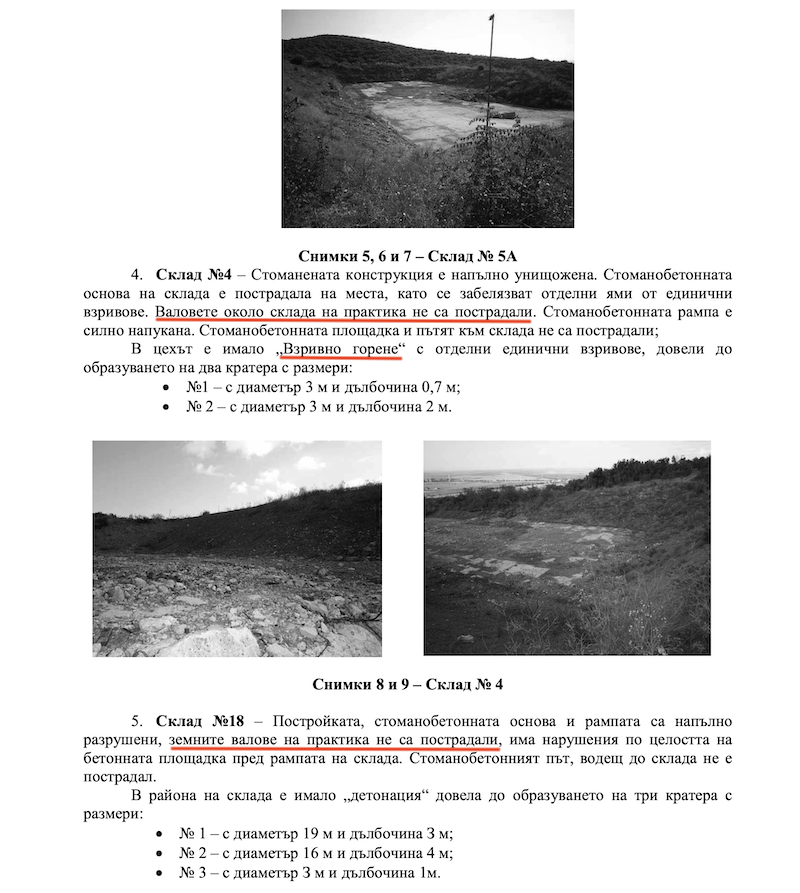
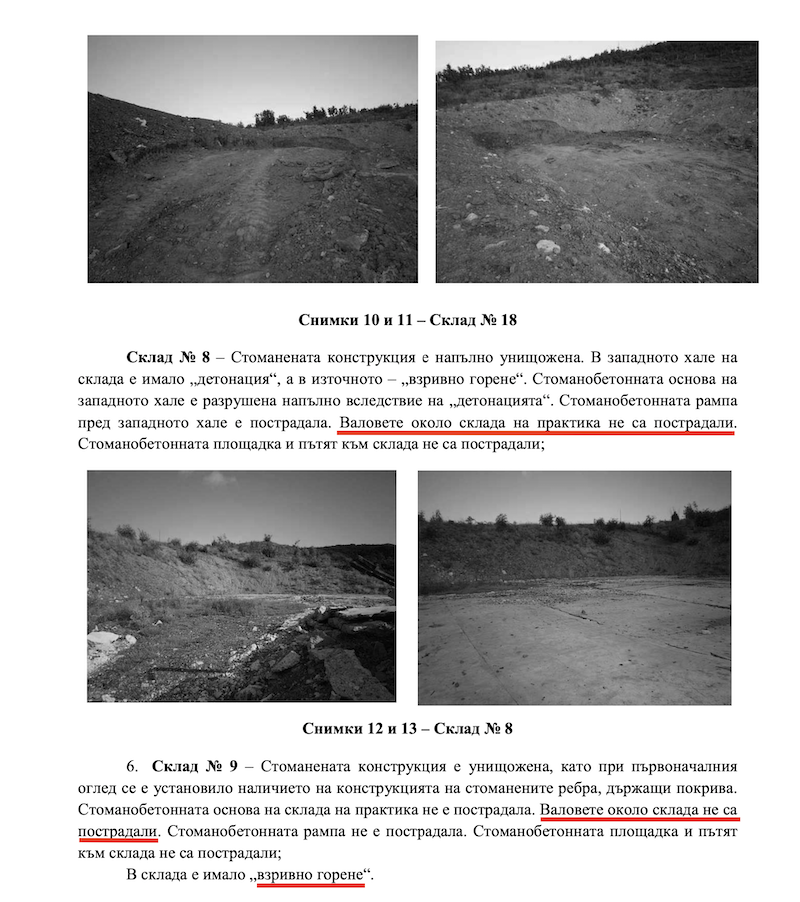
It’s a fact, that a fire broke out right where the Sage Consultants’ goods for Georgia were stored. And no one can explain how the fire reached all the warehouses, passing through the protective shafts without even burning the grass on them. In the case of an industrial accident and not a diversion, the expertise does not explain this phenomenon. The remoteness of the individual warehouses increases suspicion, that for the destruction of each of them a separate action, such as ignition, has been taken. There is no other logical explanation to answer why the protective shafts remained.
The interrogations also mentioned a Nokia phone, which no one recognized as his mobile. However, investigators do not bother to investigate another hypothesis, such as sabotage, and so far, maintain that it is an industrial accident and criminal negligence.
There is also information about other incidents classified as sabotage, which are not included in the prosecutor’s list with sabotage of the GRU. As EMCO emphasized in its statement: “In particular, there are no answers to the questions about the explosions in VMZ “Sopot” on March 21 and April 15, 2015, which at that time were qualified by the official Bulgarian authorities as “sabotage”. If we add to them the explosion of the Petolachkata, cases of suspected diversion are seven, but only four are officially recognized as such.
Dimitar Stoyanov, editor Atanas Tchobanov
Ако считате, че този безплатен ресурс е полезен, включете се с малка сума за неговата поддръжка. При възможност, станете наш редовен спомоществовател с опцията Месечно дарение. Това ни помага да предвиждаме бъдещи разходи и да планираме дейността си за месеци напред.
Или с PayPal тук!
Включи се с месечни вноски с банкова карта или PayPal тук!
Become a monthly donor with bank card or PayPal here!
Bank wire
Account owner: Assoc. DRJI
Owner address: 16 bvd. Saint Germain, 75005 Paris
IBAN: FR76 1820 6002 0665 0617 8570 619
BIC: AGRIFRPP882
Revolut

Crypto
BTC: bc1q8asgyunzwue3esm7p6nj8yv7umcppssktjv6e7

***
За да научавате преди всички за нови разследвания, инсталирайте си нашето мобилно приложение: 




